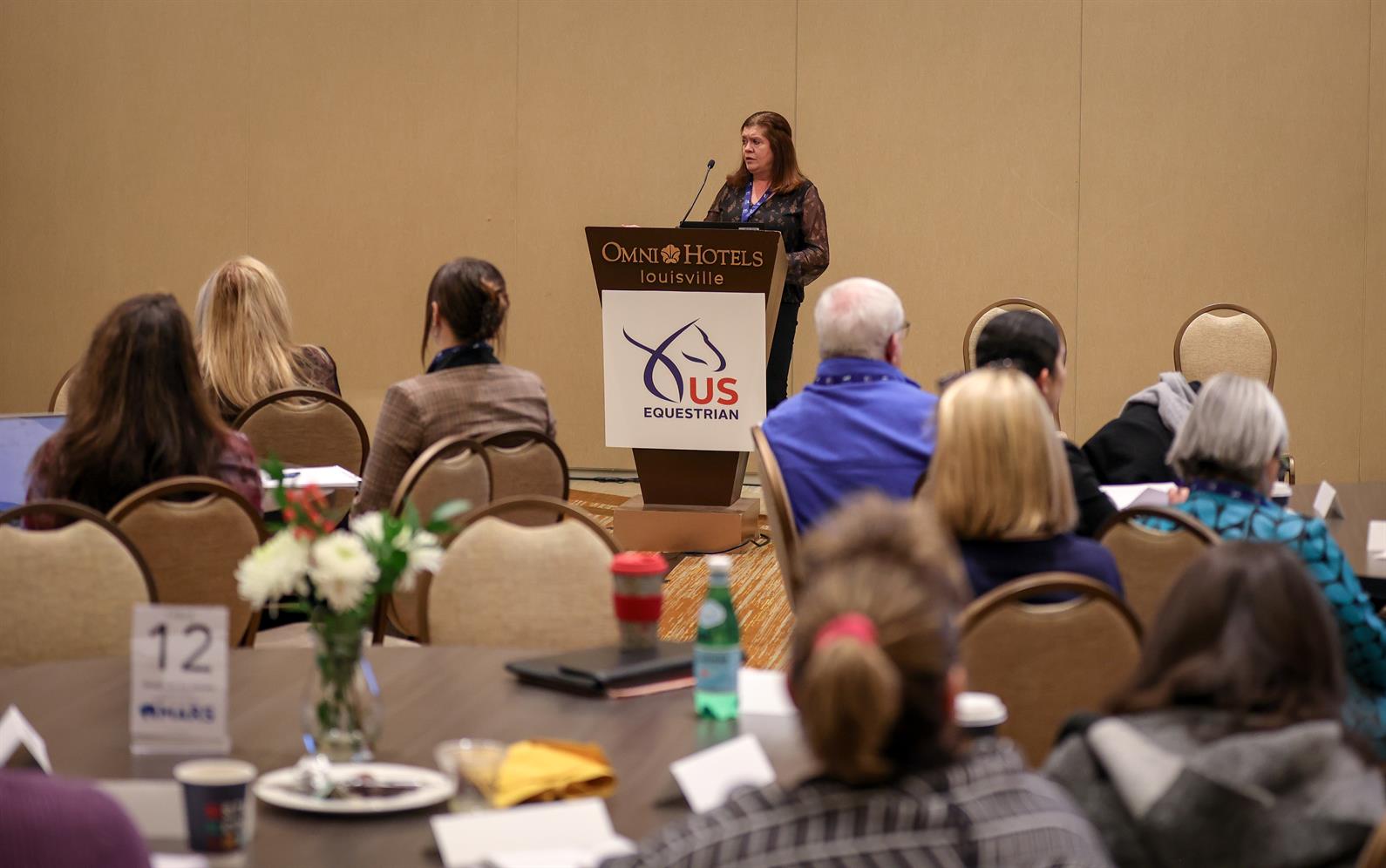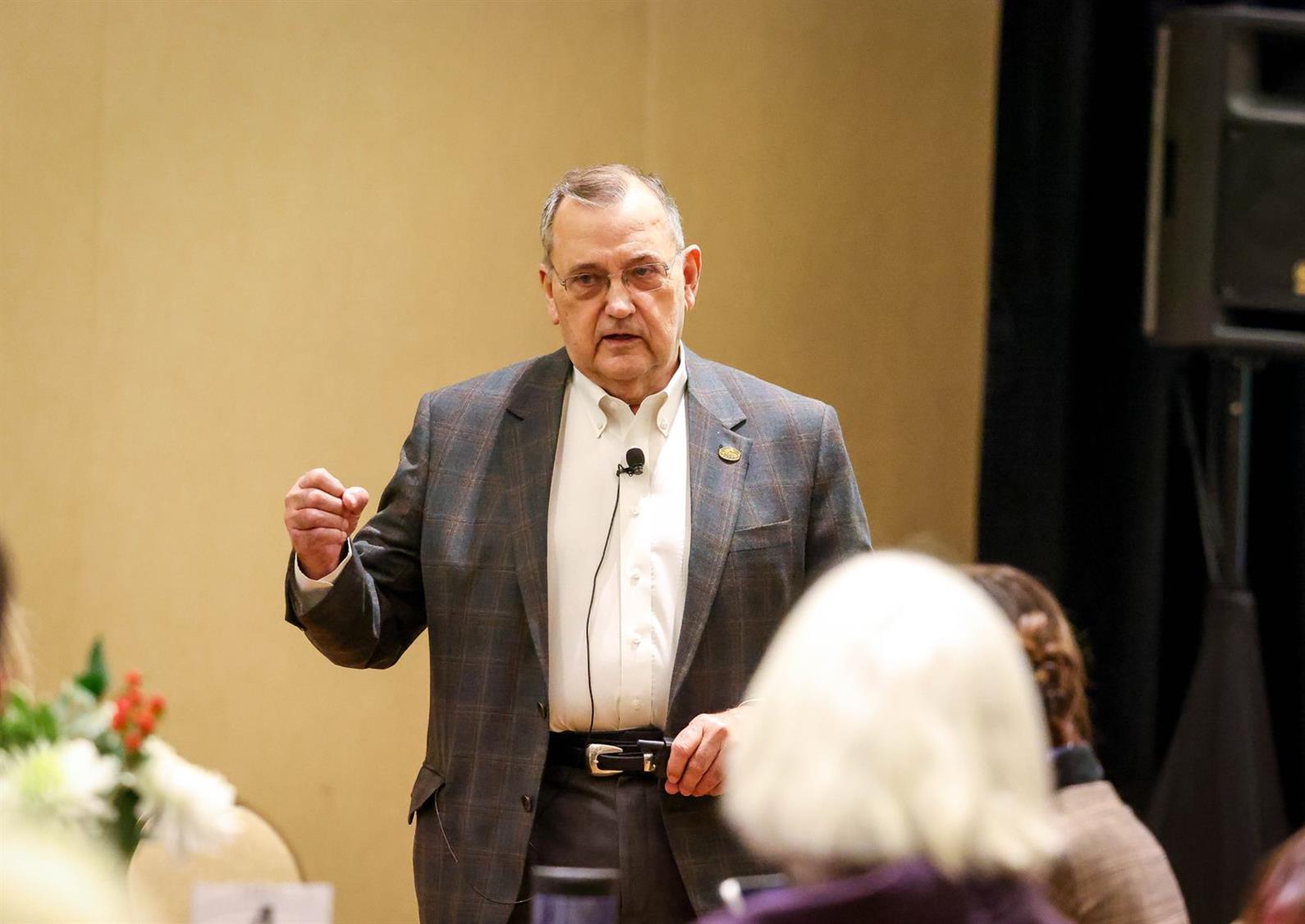Lexington, Ky. - Two highly engaging workshops were the focus of the programming on Jan. 13 during the 2024 US Equestrian Annual Meeting.
The morning and afternoon sessions on “Creating A Good Life for Horses,” graciously sponsored by MARS Equestrian™, were led by two of the leading equine academics in the United States: Dr. Camie Heleski, Senior Lecturer at the University of Kentucky, and Dr. Jim Heird, Executive Professor at Texas A&M University.
Creating a Good Life for Horses Presented by MARS Equestrian™ with Dr. Camie Heleski

Dr. Heleski shared the work she and her team completed for the Equine Ethics and Wellbeing Commission. The Commission is focused on helping the FEI be a leader in the areas of equine welfare, being a trusted voice, being transparent, being proactive, and being accountable.
“To begin, I believe that US Equestrian is continuing to push forward in a beautiful way,” Dr. Heleski said of USEF’s efforts on horse welfare. The Federation’s good work is important and timely, according to research Dr. Heleski and her team conducted for the Commission.
“We found that 65% of the public were concerned about the involvement of horses in sport,” stated Dr. Heleski. “Additionally, 67% of the public felt that welfare standards are not adequate or could not be provided for in equine sport.”
The Commission’s report found six priority focus areas for the equine industry in order to maintain its social license to operate:
- Training and riding, tack and equipment
- Recognizing physical and emotional stress with our horses
- Accountability, enforcement, knowledge
- The other 23 hours (What horses do while not training)
- People’s competitive drive and treating the horse as a number
- Horse’s health problems that could mean the horse is not fit to compete – and the potential of masking said health problems
With these priority focus areas in mind, the Commission will be making recommendations to the FEI on the use of certain tack and equipment; a proposed rule that applies consistently to all disciplines, allowing elimination on the field of play on horse welfare grounds; and the creation of both an education group and the start of fundraising efforts to do more research in the area of equine welfare.
“Our Commission would really like to see the FEI have a person or a small committee that has a bottom line focused on the wellbeing of the horse,” stated Dr. Heleski. “This person or group is not focused on the financial or legal concerns of a problem but focused on the wellbeing of the horse, solely.”
Another takeaway from the Commission’s report was the proposal for the inclusion of the Equestrian Charter. “We are hopeful we can get all owners, grooms, trainers, owners, etc., to sign this charter,” Dr. Heleski said. “It is vital that people not just sign, but really read it.”
During the open question and answer session following Dr. Heleski’s presentation, US Equestrian Chief of Sport David O’Connor mentioned that the Equestrian Charter could be easily integrated by USEF in the year to come. O’Connor focused the group conversation on a central question: does a federation have the authority to make decisions on abuse that does not rise to the level of a state or federal crime if that abuse happened outside of the competition sphere? The question was then posed ‘if a situation was brought to the attention of USEF, could said situation be sent to the legal process within the USEF?’.
Creating a Good Life for Horses Presented by MARS Equestrian™ with Dr. Jim Heird

Equine behavior specialist and longtime horseman Dr. Jim Heird led the afternoon workshop. With more than 50 years of teaching, researching, and mentoring at universities, Dr. Heird’s knowledge of conformation and behavior is recognized well beyond classrooms and labs.
One of the key takeaways from Dr. Heird’s session was that the equine industry must listen to the public and help inform them of the good work we are doing with our horses.
“I truly believe that animal welfare is fast becoming the major challenge of the equine industry for this century,” stated Dr Heird, who said that the younger generation has increased focus on the wellbeing of all animals. “We are already losing kids, and if we lose kids, we lose parents. We have to begin to address this issue, and I am honored to be here today, because USEF as an organization is starting the conversation.”
Dr. Heird also introduced the topic of habituation to those in attendance, and explained how it plays into the equine industry.
“Habituation is the phenomenon by which we accept as commonplace those things that at first we found to be distasteful and/or wrong,” stated Dr. Heird. “Every one of us is habituated about something.”
Dr. Heird explained that habituation can range from smoking to some of our equine practices. Dr. Heird also connected habituation to topics that had been discussed widely among the last two Annual Meetings.
“You all have talked for two years on the social license to operate, which is commonly used to describe the public’s acceptance of an organization or industry and its actions. Without tacit approval, we risk being rejected and forced out of existence,” cautioned Dr. Heird. “The newest term is the social license to thrive, which is that we must be able to show a dedicated effort to address the public’s concerns about our industry. Doing it within our own organizations will not change the public’s concerns. It requires a committed engagement with our detractors to show them we are making progress.”
Dr. Heird closed his session by focusing on who is responsible for equine welfare. He said that everyone is, but equine professionals and organizational leaders should lead and be the voices of authority.
“I really like this quote from the late Colorado State University Distinguished Professor Bernie Rollin: ‘It’s simple. As an industry, we need to quit doing the 5% of our practices that activists spend 95% of their time criticizing us about,” stated Dr. Heird. “We all know we are pretty good to horses, so let’s fix the 5% that is wrong!”
At the conclusion of Dr. Heird’s session, US Equestrian Chief of Sport O’Connor led an interactive activity with those in attendance. Earlier in the conference, O’Connor had asked attendees to anonymously write down their biggest concerns in the equine industry. After collecting the responses, O’Connor had each table discuss the most common answers to the prompt, which were excessive or incorrect lunging and rollkur (over flexion of the head and neck) in both English and Western disciplines. During the breakout session, each table discussed what could be done, and responses were noted for future deliberation.


